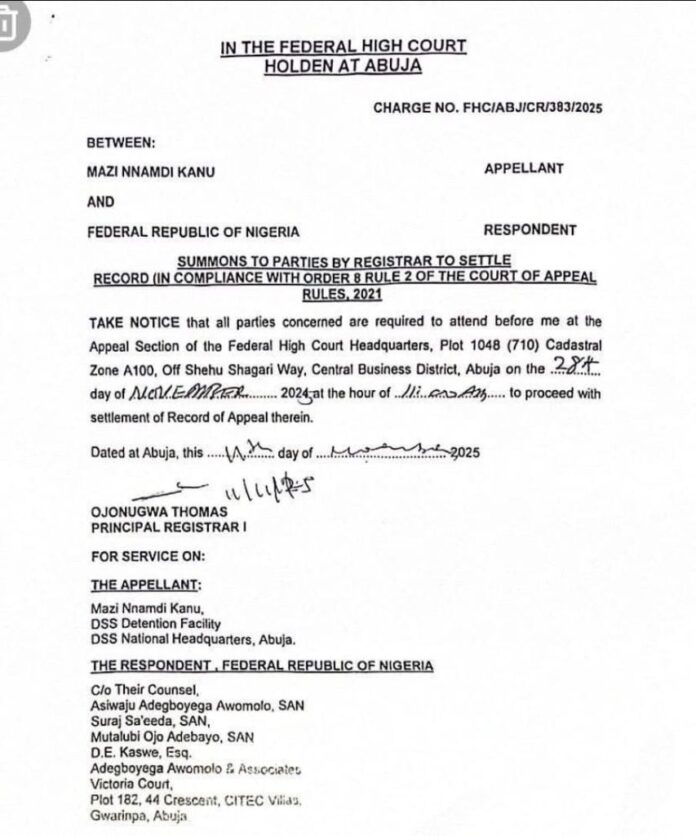A fresh controversy has emerged over the ongoing legal proceedings involving the detained leader of the Indigenous People of Biafra (IPOB), Nnamdi Kanu, as his brother, Prince Emmanuel Kanu, alleged on Thursday that the Abuja Division of the Federal High Court refused to issue a warrant needed to bring the separatist leader from Sokoto Prison to Abuja for the settlement of appeal records.
According to him, the court’s refusal has made it impossible for Kanu to be transported to Abuja for the mandatory settlement of records scheduled for November 28, 2025—a crucial step in the appeal process against his recent conviction.
Kanu, who was convicted on terrorism charges and sentenced to life imprisonment on November 20, 2025, is currently serving his sentence at Sokoto Prison. His legal team filed a notice of appeal after the judgment, challenging the conviction delivered by Justice James Omotosho of the Federal High Court in Abuja.
In a statement circulated to journalists, Prince Emmanuel shared copies of the official summons issued by the Abuja Federal High Court, directing Kanu to appear before its Appeal Section on November 28 for the settlement of records related to the appeal.
Settlement of appeal records is a formal process required under Order 8 Rule 2 of the Court of Appeal Rules, 2021. It ensures that both the appellant and the respondent agree on all documents that will form the basis of the appeal before the Court of Appeal.
However, Emmanuel said the court failed to issue a production warrant—sometimes called a movement order—which would legally compel prison authorities in Sokoto to bring Kanu to Abuja for the court session.
A message forwarded by him read:
“This is a summons to Mazi Nnamdi Kanu to appear on November 28 at the Federal High Court in Abuja for the settlement of records regarding the appeal he filed prior to the November 20 judgment. A production warrant is required for Sokoto Prison to transport him to Abuja, but the Court declined to issue it.”
The summons, dated November 11, 2025, and signed by Ojonugwa Thomas, Principal Registrar I of the Federal High Court, mandated all parties to appear at the Appeal Section of the Federal High Court Headquarters in Abuja at 11 a.m. on the scheduled date.
The notice read in part:
“Take notice that all parties concerned are required to appear before me… to proceed with settlement of record of appeal therein.”
The appeal was filed under the charge number FHC/ABJ/CR/383/2025, with the appellant listed as Nnamdi Kanu and the respondent as the Federal Republic of Nigeria.
Prince Emmanuel expressed concern that the refusal to issue the warrant could delay or frustrate the appeal process. He noted that without the court order, prison authorities cannot legally transport Kanu out of Sokoto, meaning he may miss the November 28 session.
However, Emmanuel said the summons explicitly requires Kanu’s presence, making the court’s refusal more concerning.
Nnamdi Kanu, one of the most controversial figures in Nigeria’s recent political history, has faced multiple charges over the past decade linked to his leadership of IPOB—a group seeking the independence of the South-East region. IPOB was proscribed as a terrorist organisation by the Federal Government in 2017.
Kanu’s latest trial ended on November 20, 2025, when Justice Omotosho found him guilty on several terrorism-related counts. The judgment followed years of legal battles, including Kanu’s 2021 rearrest abroad and subsequent extraordinary rendition to Nigeria, which had stirred national and international debate.
While Kanu’s earlier detention took place in Abuja, his transfer to Sokoto Prison after sentencing surprised many supporters who questioned why he was moved far from the FCT, where his trial took place. His brother and some IPOB sympathisers argue that the transfer has made court access more difficult and has added complications to the appeal process.
Kanu’s appeal challenges the legality of his conviction, the process leading up to the trial, and the evidence relied upon by the prosecution. His lawyers have signalled they will challenge both procedural and constitutional grounds of the judgment.
The settlement of records is the first major administrative step in preparing the appeal for hearing before the Abuja Division of the Court of Appeal.
Failure to complete the record settlement could delay the appeal significantly, something Kanu’s family fears may be deliberate.
“This is part of the appeal process, and for them to refuse the warrant raises questions,” Emmanuel said. He insisted that Kanu has the constitutional right to pursue an appeal without unnecessary hindrance.
Members of IPOB have reacted strongly to the allegation, claiming the refusal to issue the warrant is part of a larger pattern of unfair treatment. They say the federal authorities want to control Kanu’s movement and legal access.
Human rights lawyers have called for clarification from the judiciary. One lawyer, who asked not to be named, said:
“Appeal processes must be handled transparently. If a court issues a summons requiring the appellant’s presence, then the necessary warrant should follow. Anything else undermines confidence in the system.”
However, some legal observers say there may be technical reasons why the warrant was declined, including the possibility that Kanu’s presence may not be legally mandatory for settlement of records. They argue that lawyers often handle such procedures.
As of the time of reporting, the Federal High Court had not responded to inquiries seeking clarification on why the warrant was not issued. The Nigerian Correctional Service also did not comment on whether it requested or received any order concerning Kanu’s transportation.
With the November 28 date approaching, uncertainty remains over whether Kanu will be present for the record settlement or whether alternative arrangements will be made.

